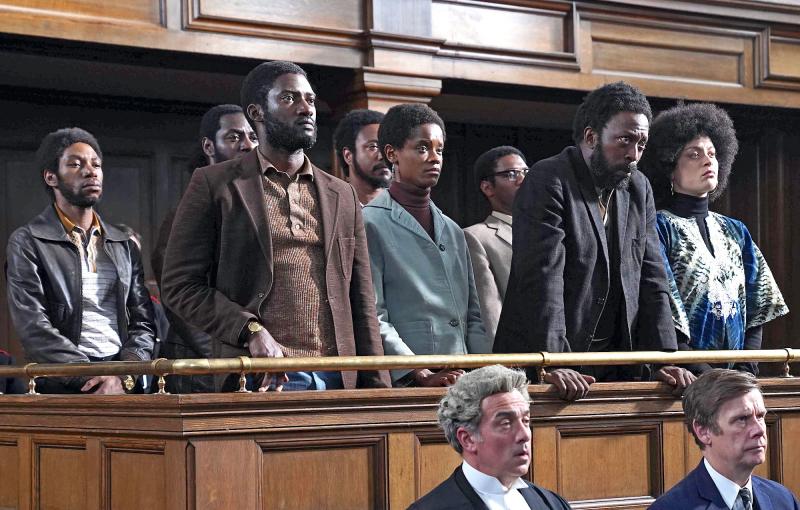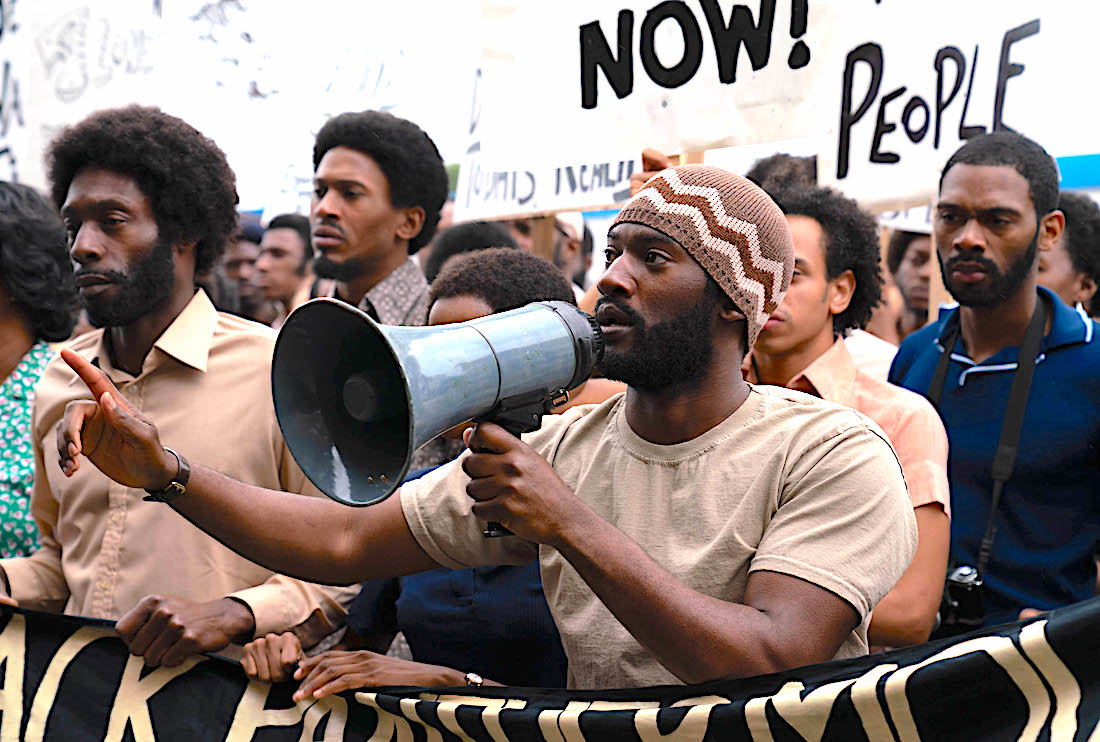Small Axe: Mangrove, BBC One review - explosive start to five films about racial injustice | reviews, news & interviews
Small Axe: Mangrove, BBC One review - explosive start to five films about racial injustice
Small Axe: Mangrove, BBC One review - explosive start to five films about racial injustice
London's burning in Steve McQueen's account of the Mangrove Nine trial

With the Black Lives Matter movement spurred this year by another wave of police brutality against African Americans, Steve McQueen’s blisteringly powerful, viscerally topical drama reminds us of the UK’s own torrid r
Mangrove is the first of five films the director has made under the banner Small Axe, each telling a different story involving London's West Indian community, between the late Sixties and the mid-Eighties. This concerns the seminal trial of the Mangrove Nine, in 1970. In the dock, not just the residents of Notting Hill spuriously charged with riot and affray, but the British system of so-called justice that put them there.
It opens in 1968, as Frank Crichlow (Shaun Parkes) prepares for the opening of his new restaurant, the Mangrove. As a swooping camera follows Frank through the West London streets, it doesn’t reveal the gentrified area made famous by the romantic comedy of Notting Hill, but one that’s multi-cultural and decidedly down at heel. The elevated Westway is still being constructed; graffiti on one slab of concrete reads “Powell for PM”, referring to the MP Enoch Powell, whose infamous “Rivers of Blood” speech was also made in 1968 – these three words telling us exactly where we are in terms of British race relations.
There’s a brief period of optimism, as Trinidad-born Frank’s aim to provide "spicy" food, only, to the locals quickly draws in the crowds. Unfortunately, it also attracts the attention of PC Pulley (Sam Spruell), a rampant racist who sets out to destroy both the Mangrove and its proprietor. Raid after unjustified raid on the restaurant ensues, accompanied by violence. Frank complains to his MP and the Home Office to no avail. Finally his activist friends, including British Black Panther leader Altheia Jones-LeCointe (Letitia Wright) and Darcus Howe (Malachi Kirby, pictured below) persuade him to join a peaceful demonstration against the harassment, which the police response doesn't allow to remain peaceful for long.
 McQueen and co-writer Alastair Siddons structure the film in two almost equal halves: the events leading to the trial, followed by the 11-week hearing at the Old Bailey, a court usually reserved for murderers, rapists and terrorists. If you happen not to know the outcome, resist the urge to Google.
McQueen and co-writer Alastair Siddons structure the film in two almost equal halves: the events leading to the trial, followed by the 11-week hearing at the Old Bailey, a court usually reserved for murderers, rapists and terrorists. If you happen not to know the outcome, resist the urge to Google.
The director has been in similar territory before, of course, with his Oscar-winning 12 Years a Slave. With this kind of material McQueen is a dab hand at making the blood boil and the pulse race, through myriad emotions – righteous indignation, horror, sadness, respect for those determined to defend themselves.
Importantly, he never forgets the value of nuanced characterisation; here, the accused have doubts, show flaws, fight amongst themselves about how to approach the trial. Frank wants nothing to do with politics, protesting that the Mangrove “is a restaurant, not a battleground.” His friends see that what he’s actually created is a vital hub for his community. Parkes, Wright and Kirby all excel as their characters passionately articulate their differences and the wider significance of their struggle.]
It’s vividly shot in grainy 35mm, cinematographer Shabier Kirchner’s mobile camerawork combining with terrific production and costume design to bring the period and milieu to life. And McQueen employs typically left-field visual details to raise the emotional temperature: a colander left rocking after a raid, the reflection of a man and his megaphone on a rain-lashed car bonnet, Frank raging in his cell, repeating the cry “you wicked man” at a brutal guard, while incongruously, heartbreakingly bathed in sunlight.
The future of Arts Journalism
You can stop theartsdesk.com closing!
We urgently need financing to survive. Our fundraising drive has thus far raised £49,000 but we need to reach £100,000 or we will be forced to close. Please contribute here: https://gofund.me/c3f6033d
And if you can forward this information to anyone who might assist, we’d be grateful.

Subscribe to theartsdesk.com
Thank you for continuing to read our work on theartsdesk.com. For unlimited access to every article in its entirety, including our archive of more than 15,000 pieces, we're asking for £5 per month or £40 per year. We feel it's a very good deal, and hope you do too.
To take a subscription now simply click here.
And if you're looking for that extra gift for a friend or family member, why not treat them to a theartsdesk.com gift subscription?
more TV
 Murder Before Evensong, Acorn TV review - death comes to the picturesque village of Champton
The Rev Richard Coles's sleuthing cleric hits the screen
Murder Before Evensong, Acorn TV review - death comes to the picturesque village of Champton
The Rev Richard Coles's sleuthing cleric hits the screen
 Black Rabbit, Netflix review - grime and punishment in New York City
Jude Law and Jason Bateman tread the thin line between love and hate
Black Rabbit, Netflix review - grime and punishment in New York City
Jude Law and Jason Bateman tread the thin line between love and hate
 The Hack, ITV review - plodding anatomy of twin UK scandals
Jack Thorne's skill can't disguise the bagginess of his double-headed material
The Hack, ITV review - plodding anatomy of twin UK scandals
Jack Thorne's skill can't disguise the bagginess of his double-headed material
 Slow Horses, Series 5, Apple TV+ review - terror, trauma and impeccable comic timing
Jackson Lamb's band of MI5 misfits continues to fascinate and amuse
Slow Horses, Series 5, Apple TV+ review - terror, trauma and impeccable comic timing
Jackson Lamb's band of MI5 misfits continues to fascinate and amuse
 Coldwater, ITV1 review - horror and black comedy in the Highlands
Superb cast lights up David Ireland's cunning thriller
Coldwater, ITV1 review - horror and black comedy in the Highlands
Superb cast lights up David Ireland's cunning thriller
 Blu-ray: The Sweeney - Series One
Influential and entertaining 1970s police drama, handsomely restored
Blu-ray: The Sweeney - Series One
Influential and entertaining 1970s police drama, handsomely restored
 I Fought the Law, ITVX review - how an 800-year-old law was challenged and changed
Sheridan Smith's raw performance dominates ITV's new docudrama about injustice
I Fought the Law, ITVX review - how an 800-year-old law was challenged and changed
Sheridan Smith's raw performance dominates ITV's new docudrama about injustice
 The Paper, Sky Max review - a spinoff of the US Office worth waiting 20 years for
Perfectly judged recycling of the original's key elements, with a star turn at its heart
The Paper, Sky Max review - a spinoff of the US Office worth waiting 20 years for
Perfectly judged recycling of the original's key elements, with a star turn at its heart
 The Guest, BBC One review - be careful what you wish for
A terrific Eve Myles stars in addictive Welsh mystery
The Guest, BBC One review - be careful what you wish for
A terrific Eve Myles stars in addictive Welsh mystery
 theartsdesk Q&A: Suranne Jones on 'Hostage', power pants and politics
The star and producer talks about taking on the role of Prime Minister, wearing high heels and living in the public eye
theartsdesk Q&A: Suranne Jones on 'Hostage', power pants and politics
The star and producer talks about taking on the role of Prime Minister, wearing high heels and living in the public eye
 King & Conqueror, BBC One review - not many kicks in 1066
Turgid medieval drama leaves viewers in the dark
King & Conqueror, BBC One review - not many kicks in 1066
Turgid medieval drama leaves viewers in the dark
 Hostage, Netflix review - entente not-too-cordiale
Suranne Jones and Julie Delpy cross swords in confused political drama
Hostage, Netflix review - entente not-too-cordiale
Suranne Jones and Julie Delpy cross swords in confused political drama

Add comment